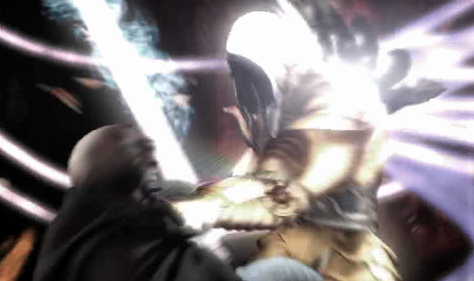Difference between revisions of "Dark Wanderer"
Belushi81x (talk | contribs) m (→Trivia: Grmamtical fix (verb tense)) |
Belushi81x (talk | contribs) (Added Image) |
||
| Line 4: | Line 4: | ||
At the end of Diablo I the hero defeats [[Diablo]], and takes Diablo's [[Soulstone]] within his own body, intending to contain Diablo there forever. Doesn't work to well for him. According to [[Deckard Cain's Journal]] it takes about 2 days for the spirit of Diablo to corrupt and posses him. At which point he became the Dark Wanderer and left [[Tristram]]. Immediately after his departure, hordes of demons killed almost everyone there. It is implied that the Dark Wanderer is directly responsible for that carnage, although it may have just been a side-effect of his presence. | At the end of Diablo I the hero defeats [[Diablo]], and takes Diablo's [[Soulstone]] within his own body, intending to contain Diablo there forever. Doesn't work to well for him. According to [[Deckard Cain's Journal]] it takes about 2 days for the spirit of Diablo to corrupt and posses him. At which point he became the Dark Wanderer and left [[Tristram]]. Immediately after his departure, hordes of demons killed almost everyone there. It is implied that the Dark Wanderer is directly responsible for that carnage, although it may have just been a side-effect of his presence. | ||
| − | ==In Diablo II== | + | ==In Diablo II==[[Image:Wanderer.jpg|right|frame|The [[Dark Wanderer]] (left) and ArchAngel [[Tyrael]] (right) do battle during a Diablo II Cinematic. |
| + | ]] | ||
After the destruction of Tristram the Dark Wanderer proceeds to the east where he frees [[Baal]] and [[Mephisto]] from their respective prisons before shedding the last of the hero's humanity and becoming fully Diablo again, ceasing to be the Dark Wanderer, and entering hell where Diablo is eventually killed by the hero(es) of Diablo II. | After the destruction of Tristram the Dark Wanderer proceeds to the east where he frees [[Baal]] and [[Mephisto]] from their respective prisons before shedding the last of the hero's humanity and becoming fully Diablo again, ceasing to be the Dark Wanderer, and entering hell where Diablo is eventually killed by the hero(es) of Diablo II. | ||
Revision as of 02:31, 2 February 2009
The Dark Wanderer was originally the hero of the Diablo I game, and becomes a NPC in Diablo II. His presence in the Diablo III game is unknown.
In Diablo I (and the aftermath thereof)
At the end of Diablo I the hero defeats Diablo, and takes Diablo's Soulstone within his own body, intending to contain Diablo there forever. Doesn't work to well for him. According to Deckard Cain's Journal it takes about 2 days for the spirit of Diablo to corrupt and posses him. At which point he became the Dark Wanderer and left Tristram. Immediately after his departure, hordes of demons killed almost everyone there. It is implied that the Dark Wanderer is directly responsible for that carnage, although it may have just been a side-effect of his presence.
==In Diablo II==
After the destruction of Tristram the Dark Wanderer proceeds to the east where he frees Baal and Mephisto from their respective prisons before shedding the last of the hero's humanity and becoming fully Diablo again, ceasing to be the Dark Wanderer, and entering hell where Diablo is eventually killed by the hero(es) of Diablo II.
The Diablo II wiki entry for the Dark Wanderer may be found here.
In Diablo III
The Dark Wanderer is mentioned in Cain's Journal on the Official Diablo 3 Website, but has yet to appear in any other fashion (concept art, screen shots, trailers etc. etc.)
He may be mentioned by NPC's throughout gameplay. It is not likely this NPC or character will return in the flesh (so to speak) during the events of Diablo III, even if different incarnation Diablo does.
Trivia
Many fans believe the Dark Wanderer to be, specifically, the warrior class due to gender and skin tone, although the lore can be interpreted other ways and Blizzard has made no official comment on the topic. Fans who believe this usually also subscribe to the theory that the rogue became Blood Raven and the Sorcerer became The Summoner, each hero succumbing to madness due to Diablo's corruption in their own way.